After grad school, a career in urban planning, and a role at the White House during President Obama’s first term, Matthew was zooming along the beaten path. Then, his father died, and Matthew vowed to follow his heart, not his head, from that point forward. He co-founded Late Sunday Afternoon, a small lifestyle company with big spirit, with his best friend Thomas Brodahl, and has been knotting and blessing Jewish prayer shawl-inspired scarves and giving back to the world ever since.
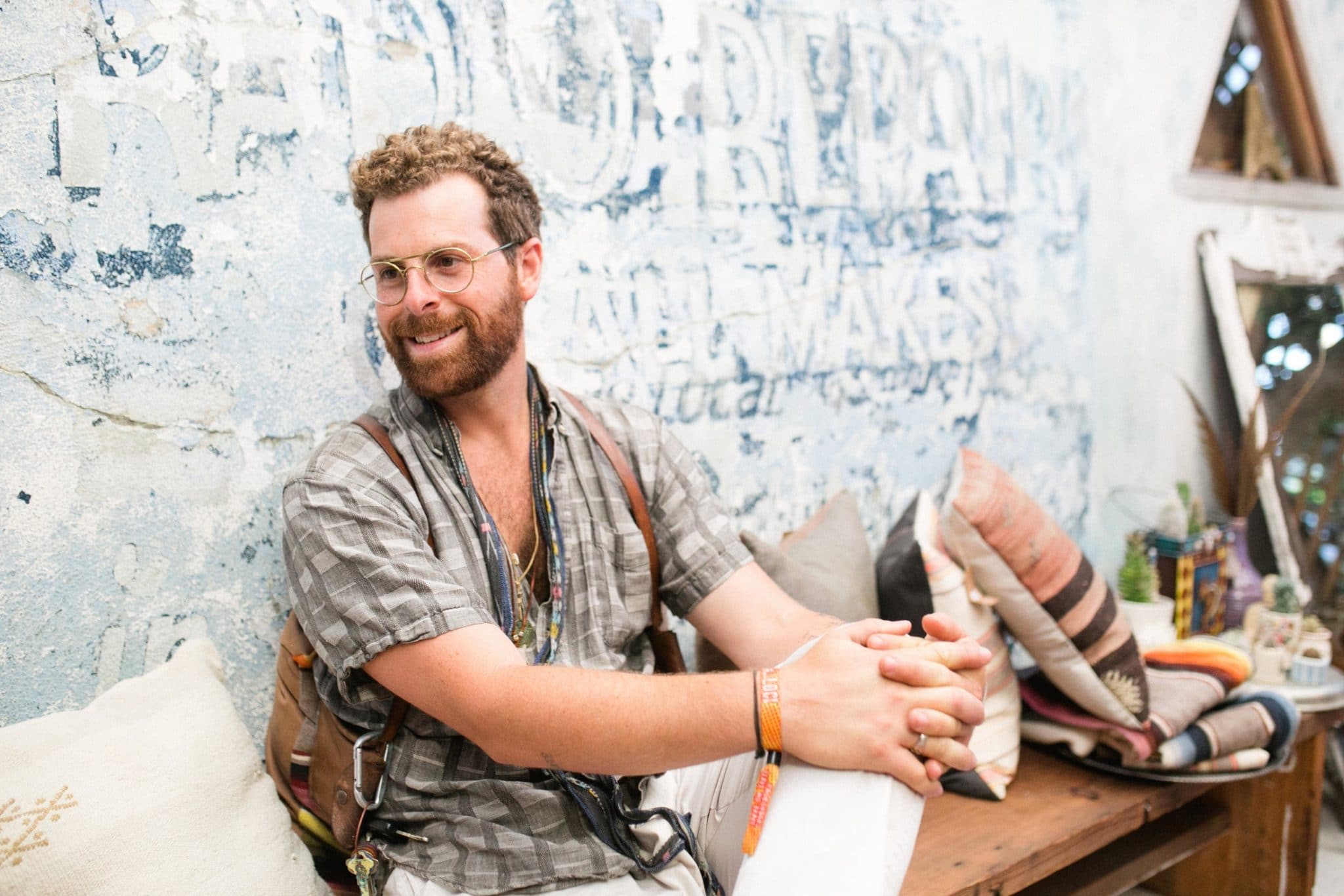
What is your earliest memory?
Being 2 and my dad holding me in his shower and just putting my face in the shower and going “Ah, ah, baby.” My dad passed away 6 years ago, so it’s a really relevant memory.
My dad was a beautiful, quiet, gentle man who was a great builder. Creative, but also very his generation. By the book, saved up, worked hard, loved watching the nightly news with some peanut M&Ms.
What’s the meaning of your name?
My name is Matthew Ian Schildkret. I’m named after my great grandfather Morris. I in Ian is for Ida. My last name in German is Schildkröte, which means turtle, although I think it means shield creator. I think our family was actually ancient shield creators.
Describe your kid personality.
Very rambunctious. Super kind and thoughtful. Very creative. Very loud. I always had a relationship with adults when I was little. I was able to converse and understand a lot. If I slept over at a friend’s house, I was always up before them, downstairs talking to the person’s mom. I was constantly getting in trouble, pushing the boundaries. I was acting in the moment even if I was hurting someone or breaking something. I think that’s because, in a wizardly way, I didn’t know how to create properly. It’s kind of like Harry Potter when he was practicing magic when he shouldn’t have been. I wasn’t wielding the spells correctly.
People really gravitated towards my energy because I was full of it.
The adults around me weren’t really sure how to best direct it. It took a lot of therapy and sports and art and plant medicines to figure it out. It’s been a long journey.
What advice would you give your teenage self?
To ask his parents to leave the matrix sooner. I would rather have been sent other places to learn different skills and traits than the bubble that I was brought up in. I was put into a school system in a box and told to conform and I shamed myself based on how I thought I wasn’t like other people in the class, even though I was totally different. I would give myself the advice to learn more about the world and find ways to get out of my current situation. If you’re not happy with your life, go look at how other people are living and find your happy.
How did Judaism play a role in your childhood?
Judaism played an enormous role. My brother wore a kippah all through high school, I wore a kippah and tzitzit up until Junior year. When my brother came out of the closet, I realized I had been copying him, and it was scary. I wondered, “Am I gay? Am I straight? Am I Jewish? Am I not?” I dropped out of USY, I stopped wearing a kippah, I joined the track team.
As a child, I never thought anything was impossible. I think that comes from a very Jewish way of surviving. Jews have constantly been pushed to the limit. Move, start over, ingratiate yourself in the community, be the best you can, make your money, provide service. In that way, I feel like an ancient Jew.
We grew up religious, Conservative. I loved lighting candles, my father blessed us every Shabbos. As I begin to start my own family, I’m learning how to bring Judaism into my world in a way that makes us feel comfortable.
I think that’s why Judaism struggles these days. It conforms to something that doesn’t truly represent the will of the people.
It would behoove current rabbis, in my opinion, and religious people to really look back at our history and the Talmud and ask ourselves questions like, “Why did rabbis make these decisions?” What could benefit Jews today maybe didn’t benefit us thousands of years ago, but we are a people of change and we aren’t about being rigid.
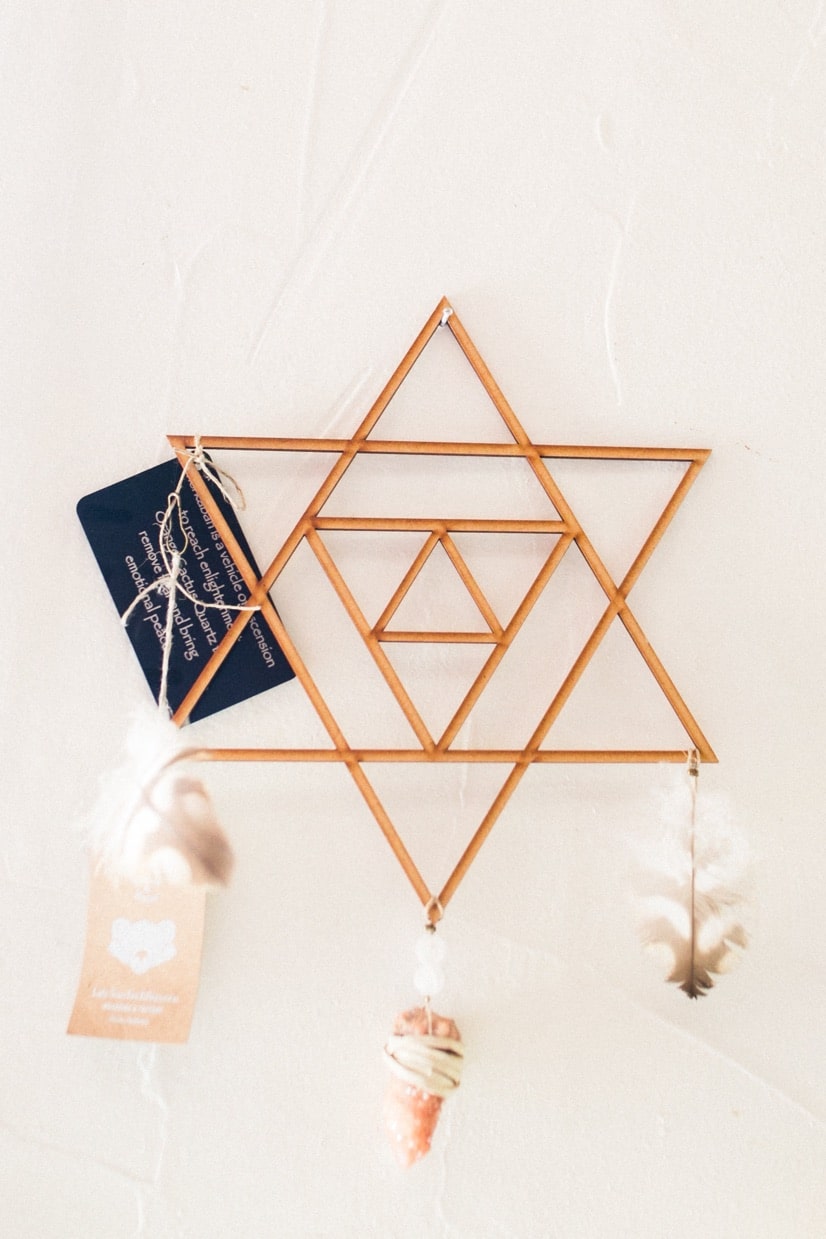
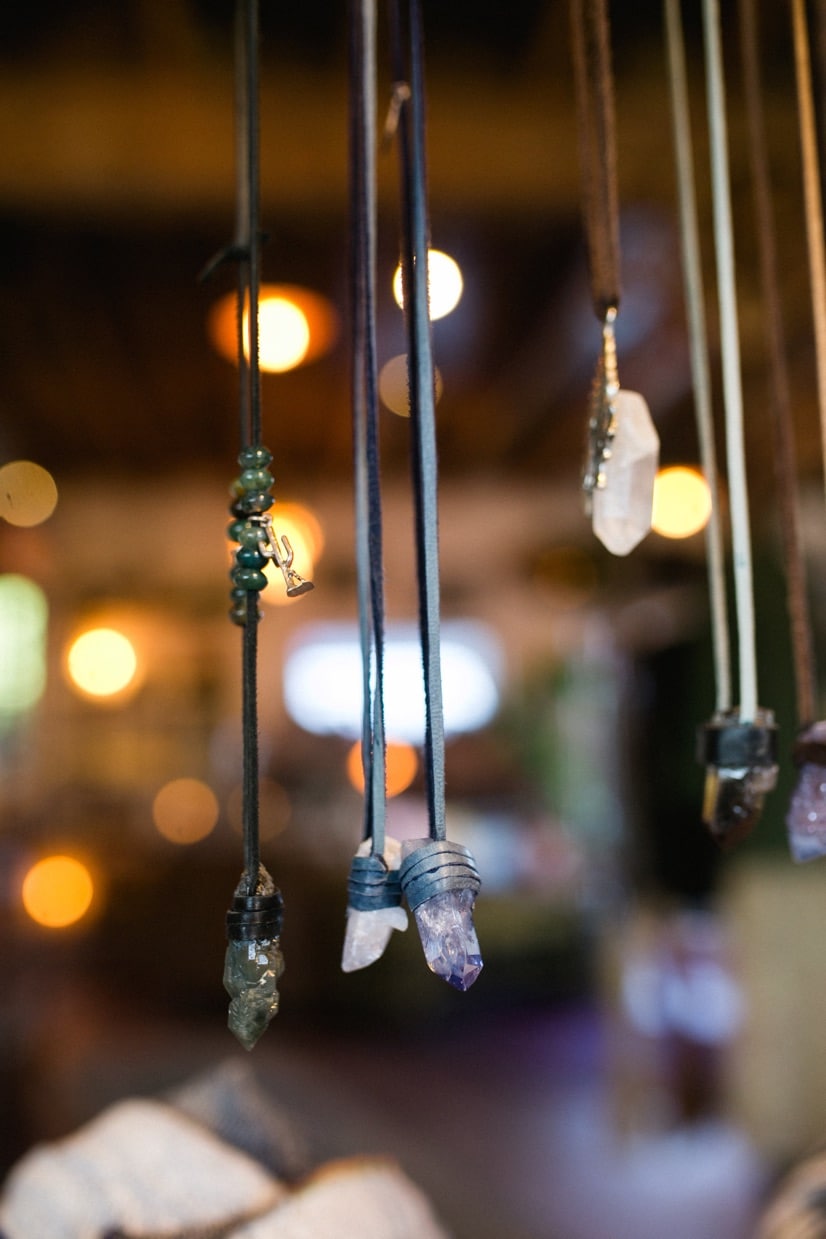
What is your favorite place on Earth?
Earth.
Is there a particular place that you just love to be?
Venice. I’ve lived 17 places in 14 years and I stopped here.
The feng shui of the bay of this area, the way the energy comes in, the way the sky is, there’s just something here where I feel very powerful and creative and whole. I surf as much as I possibly can. The ocean cleanses me and scrubs me of my ego and humbles me. It makes me a better human being.
What do you value in your friends?
The Venetians that I hang out with are open and loving and creative. They’re artists, they’re musicians, they’re yogis, they’re the world’s leading entrepreneurs. They are peacemakers, they are graphic designers, they are photographers, they’re beautiful people. I surround myself with people who are positive, who give me constructive criticism in a really upfront, honest way. I surround myself with people who love good food, and I surround myself with people who have integrity.
I don’t keep people in my life just because.
I feel like a snake that’s constantly shedding its skin, and who I was 10 years ago is similar to who I am today, but I don’t feel accountable to that person’s life.
There’s a documentary filmmaker who follows people every 7 years of their life. I recently just saw 56 Up, and it’s beautiful to see people go through their lives. The ancestral wounding, the cultural wounding, the wounding they get from their own story, and to get to see how they live. I work with my shadow and I take accountability for the things that I’m struggling with, because I know that they’re powering my present moment. If I can stay true to what’s really going on inside of me, I can do the good work.
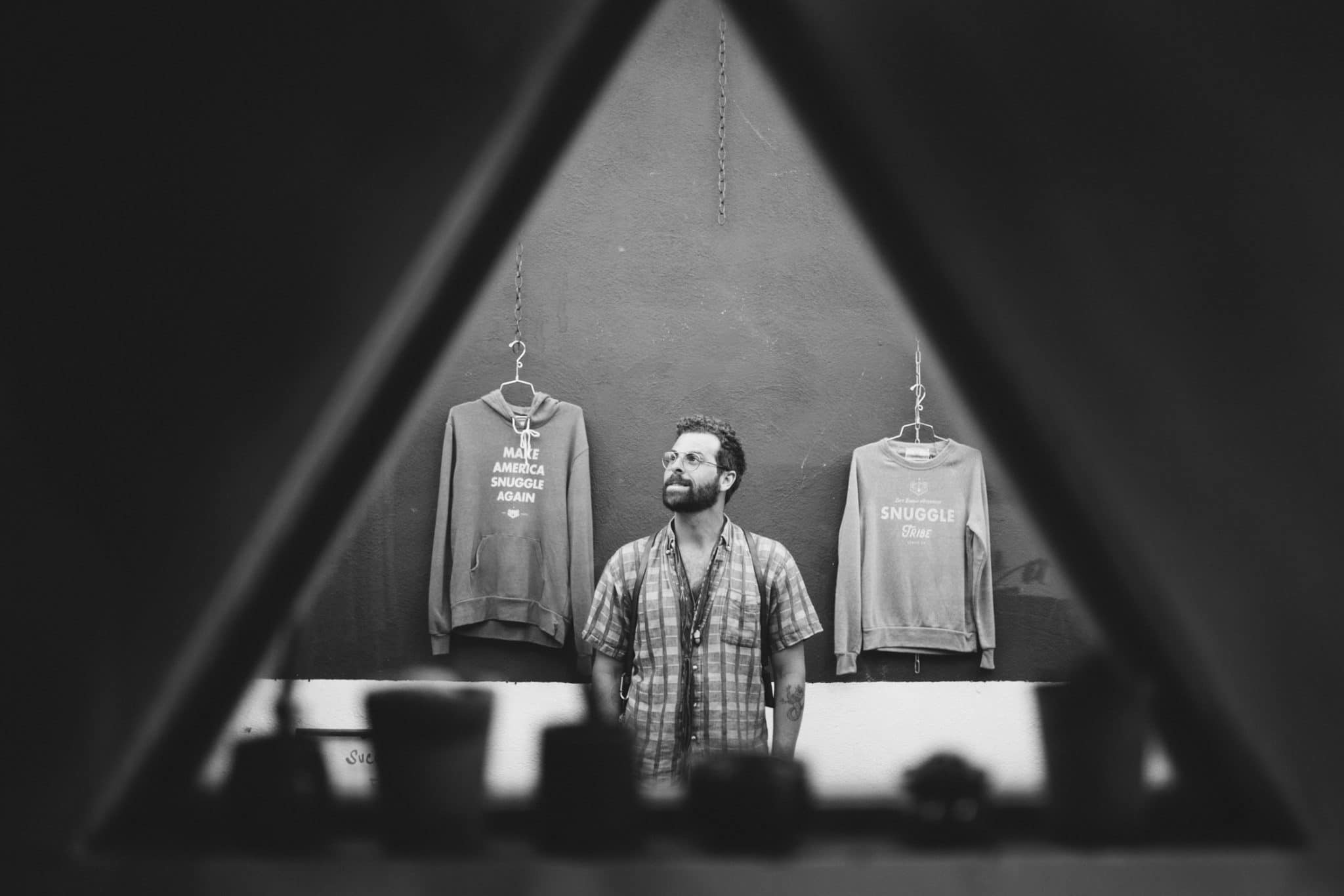
What’s the story behind Late Sunday Afternoon?
You go to grad school, you work hard, you get this White House job, and then my dad dies, and I consider, “Let’s think about what my spirit really wants and not what do I think will serve me in the future.” It’s the difference between me, my former self, being more destination-based and my current self being more direction-based. My direction is from my heart, my destination is from my head.
I moved into this pod that I built in a transitional community’s backyard down the street, and I lived there for 8 months. I surfed and I painted a collection which I showed at The Otheroom. It’s this enormous oil painting collection about my dad’s passing, about how his spirit left his body. After that, Occupy Wall Street started. I started Occupy Venice with some friends, and I moved into Windward Circle and lived there for about 2 months and that was really tough. We were renouncing the hypocrisy that was going on.
When that ended, I decided to write an illustrated children’s book to influence new parents. It’s called Change I Will.
I had been making scarves for the homeless people that I was sleeping with and, one day, I was at Venice Beach Wines and this woman from Hawaii tried on my scarf while I was eating dinner, and she slapped her husband and said, “Give him whatever he wants for it.” He gave me $85.
One of the last things my dad ever told me was, “You don’t need a great idea, you just need an idea you feel really connected to.”
I love working with my hands, and I love the way this woman looked at my scarf, and I thought, “I’m gonna buy more fabric.” I would sneak in when the seamstress down the street at the fabric store went to lunch. I got busted, so I bought my own machine. I started an Etsy shop, and it was doing OK, then I put up my own website, then I started to do the Renegade Craft Fair and Unique LA and trade shows and really putting myself out there. 5 years later, I was offered this store.
Paul and Tiffany Hibler, the owners of Pitfire Pizza and Superba Food + Bread, curated the whole block. They wanted this store to be a Venice local shop by a Venice local and it was a handshake deal. She said, “I trust that you’ll make this beautiful.” The next day, we started demolishing.
My business partner and I and our artist collective renovated the entire place ourselves. We put in all old beams, old windows, I restored the wall outside, we’ve touched everything. We did all the drywall, sanding, cleaning. I personally built the kitchen, the island, the bathroom. Everything is about as authentic as it gets. The magic in here that you might feel is from people really touching everything.
I make everything in the shop that’s sewn. The rest, from the ceramics to the lights to the brooms to the soaps to the candles, I make with my friends. We collaborate. The rest is all books or vintage. I sell a ton of kids books because my mom was a library studies schoolteacher and I grew up as an artist. It’s like a little play center. I built it this way so I could spend every day here and not feel like I’m at a job. I feel like I’m inspired to create and redesign.
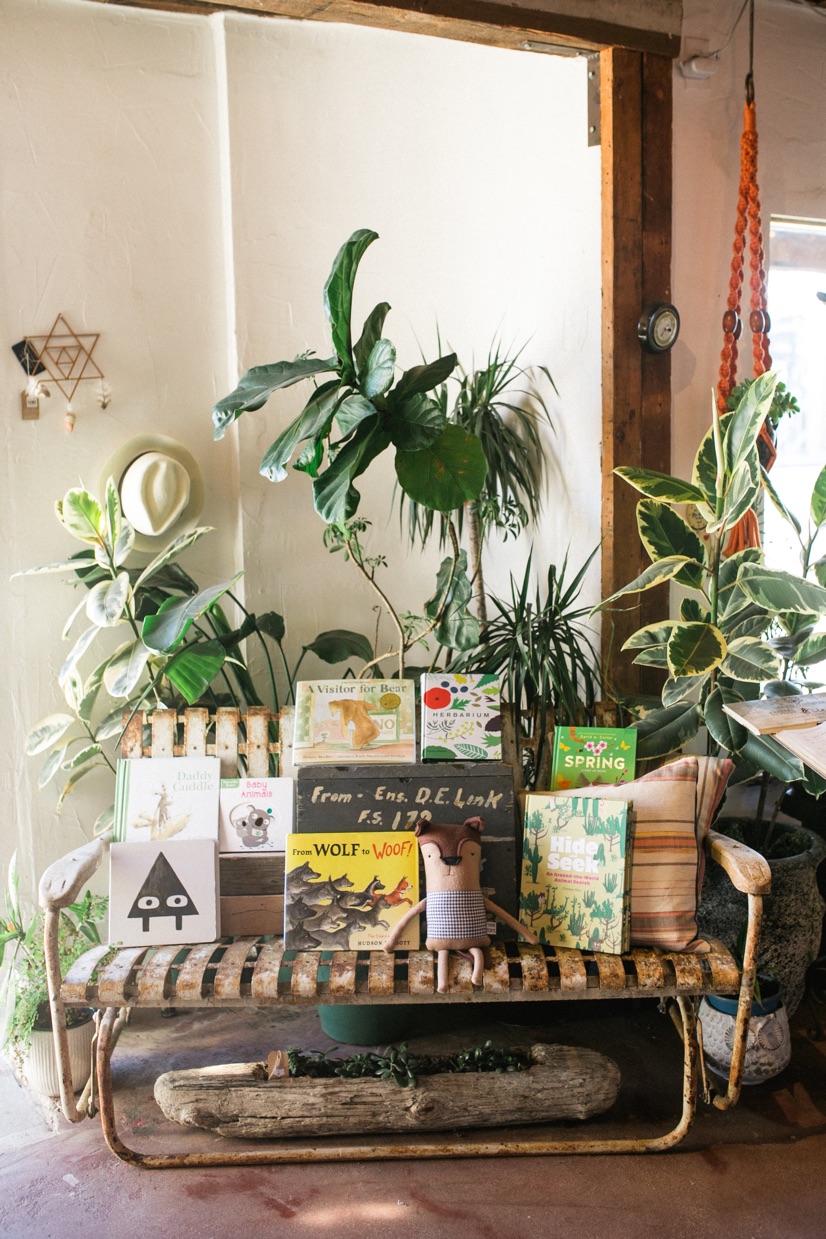
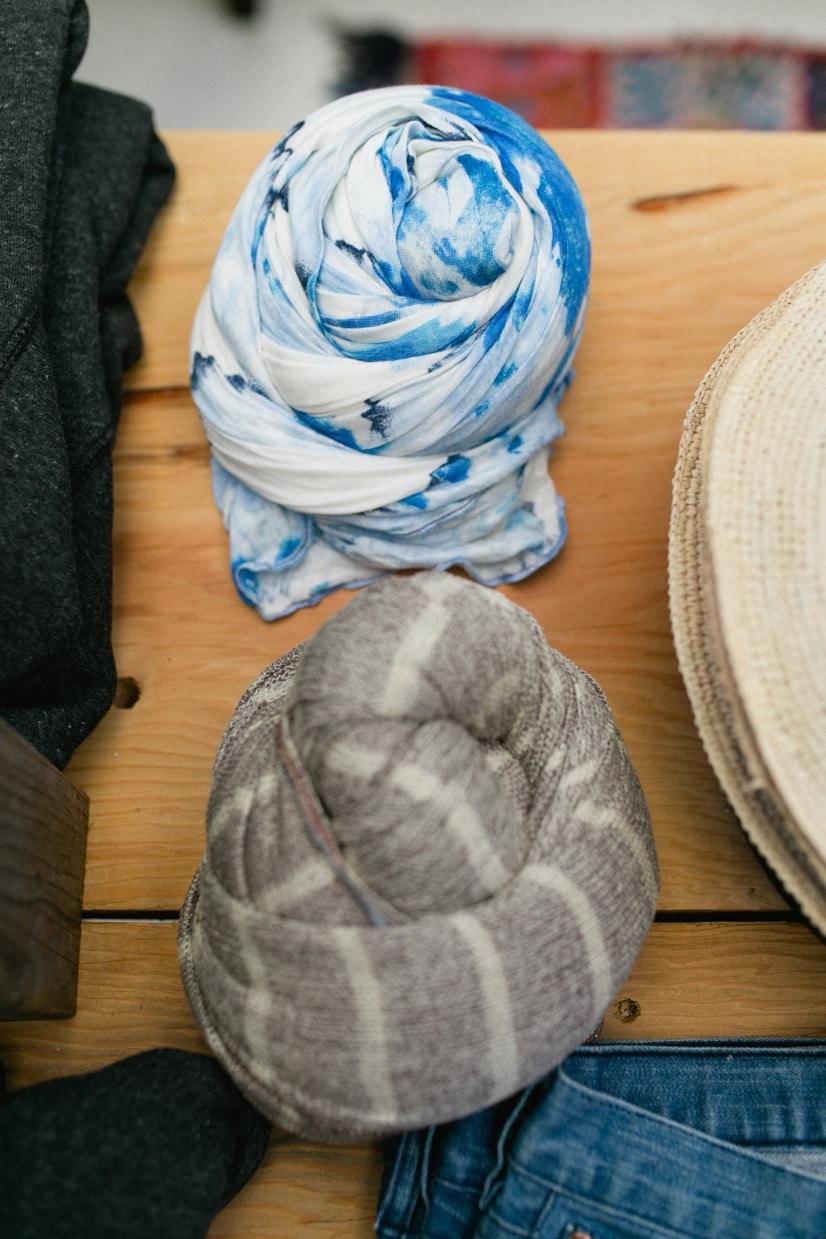
How does Late Sunday Afternoon help others?
I want to show the community that what I am doing is not just selling things. I’m a purveyor of an experience. When you come in, one of my big things is I gift a lot. Someone comes in, they try something on, they’re not ready to make the purchase. If I feel they look amazing, I’m going to give it to them. I don’t think it’s exactly tzedakah, but I believe in changing how people feel, and if someone receives a gift, it’s going to change how they feel.
One of the biggest pollutants on Earth is fashion. I stuff all of my fabric trash into burlap bags that I get from Groundwork Coffee Co. and make dog beds for the local dog shelters. Any extra fabric that is big enough to make a blankie, I make baby blankets for the Department of Children and Family Services.
The scarves that I make, I knot and I bless everything to love, happiness, adventure, mystery, like a tallis. In Kabbalah and in the ancient shamanism of Judaism, the four directions were love, happiness, adventure, and mystery, but they had more to do with the way in which people journeyed through their own soul and how, as Jews, we spread light. That’s what I preach now to people. A rabbi non-rabbi.
The blankies that I make for the foster care system, I bless to balance, love, home, discovery, play, and peace.
What I tell everyone is, “I knot and I bless this for you so you can learn how to bless yourself, and when we learn how to bless ourselves, we create a positive vibration inside, and we project positivity outside. When you buy my scarf, whether you look at it, you wear it, or you remember it, it’s a chance for you to bring yourself into your own mindfulness practice.” It’s kind of like an Amidah, like the prayer.
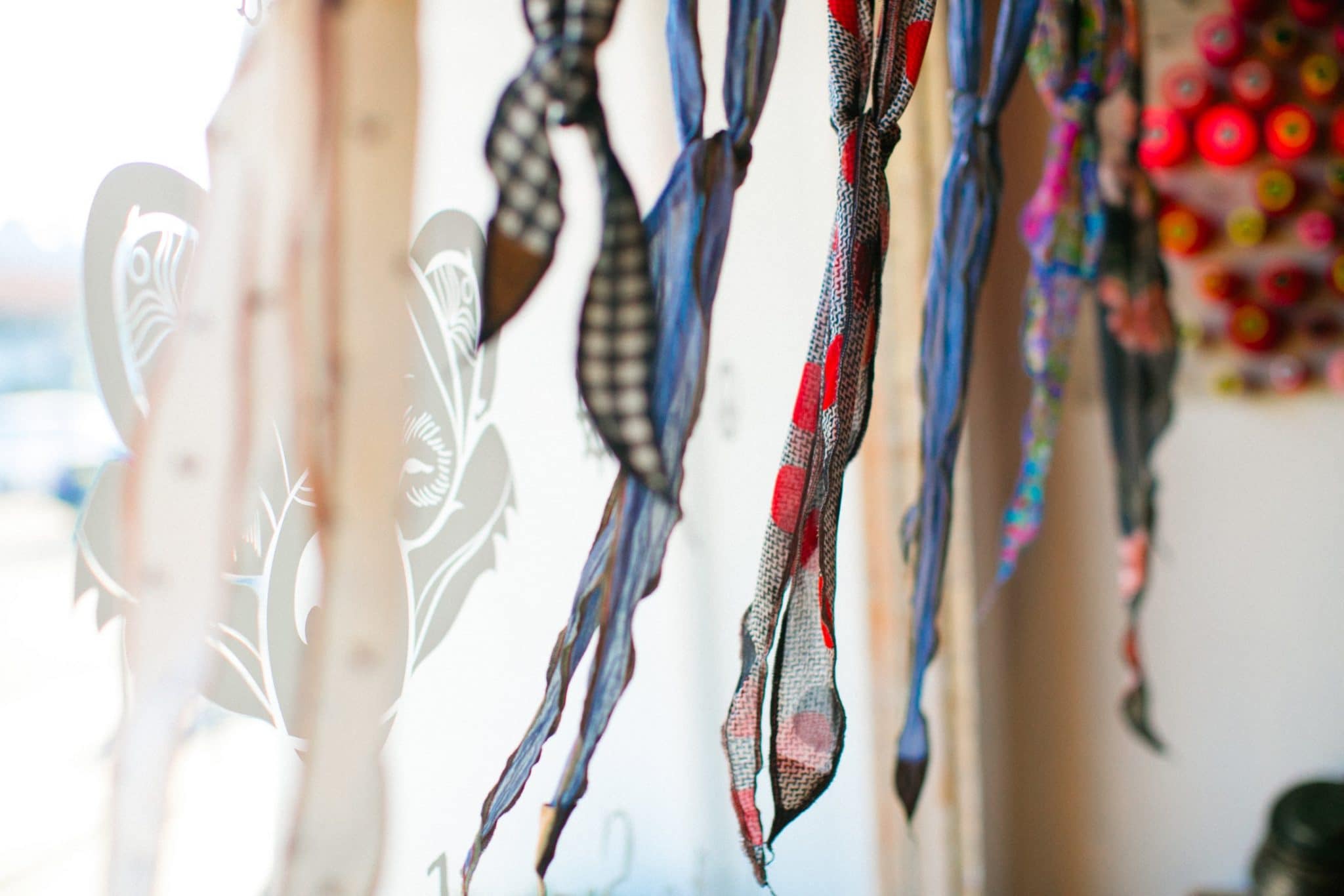
What do you admire most in others?
I love new parents. I watch men go from guys to compassionate humans, like immediately. I also like seeing people who are really on their path, who aren’t defined by financial success or social success. Their skin, their aura, their vibration looks lived in.
What’s the most overrated virtue?
Well, it’s definitely not patience. That’s an amazing virtue. I’m really learning that one.
I think success is the most overrated virtue. Greed is the thing that humanity gets to move beyond. The abundance is real.
I don’t understand how someone who has billions or hundreds of millions isn’t spending every day of their life helping people.
If I had a billion dollars, I would want to de-pave all of LA and create a social transportation system and urban gardens everywhere and feed and clothe everyone who’s homeless or hungry. I don’t understand why people don’t live their life with legacy. The real legacy when you’re on your deathbed is what did I do with my time and how is my energy going to keep on vibrating once I leave?
How did you meet your partner?
I was just talking to my therapist while I was building this store and saying I’m so lonely, and he said, “You’re working on a major project. When you’re finished, you’ll probably meet someone.”
We had the grand opening, and the second to last person who said goodbye to me was this beautiful girl who sat on my lap and kissed me goodbye and said, “I had an amazing evening, I’m having a house party tomorrow, you should come.” We’ve been together ever since.
She’s a therapist who specializes in addiction and she is totally blowing my mind and calming me down and making me feel like having a family is real. She keeps talking about wanting to convert. She really enjoys lighting the candles. It impresses me that she’s interested in converting not to conform but out of interest in the mysticism of our culture.
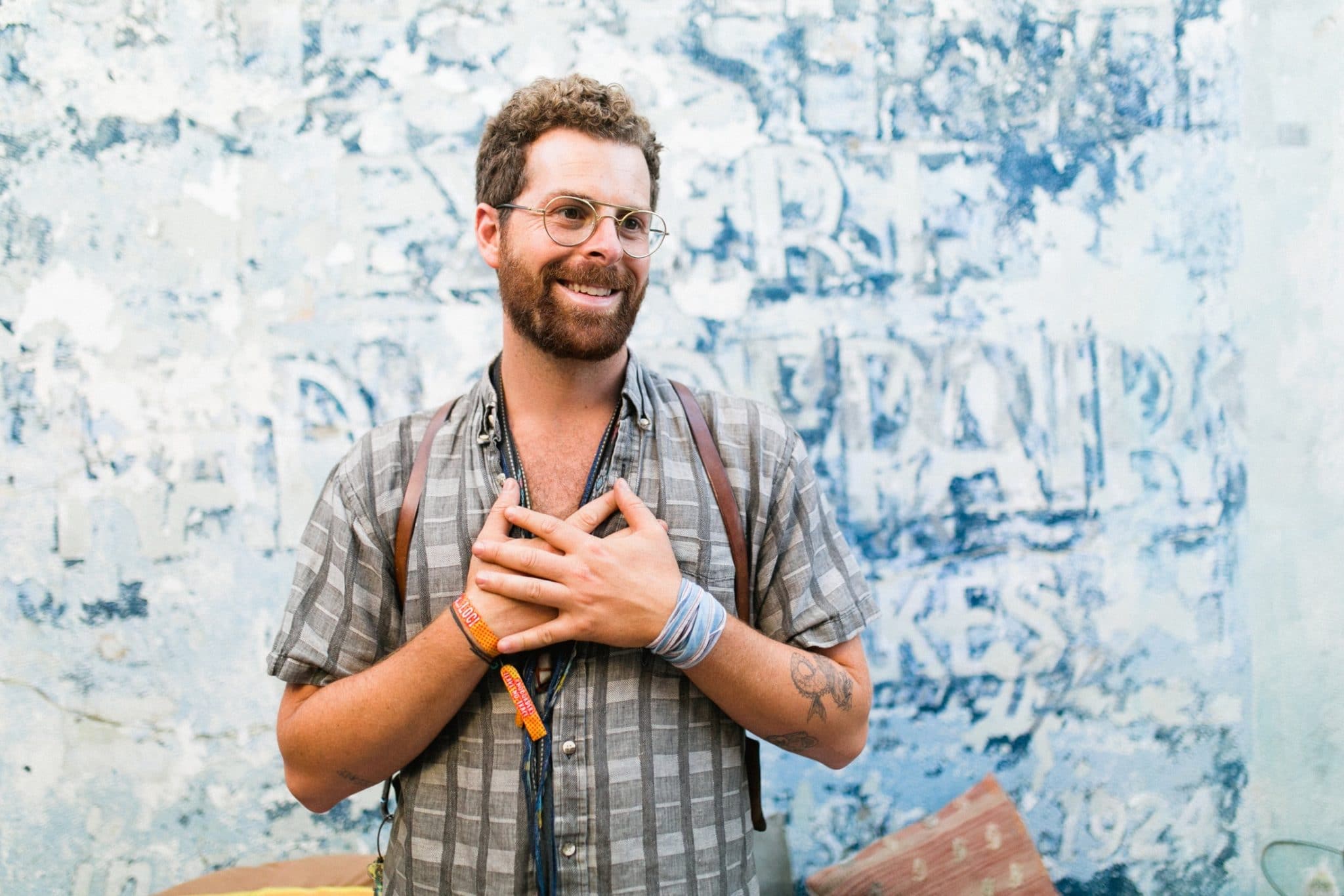
Do you know a funny joke?
I do know a funny joke. It’s one of the oldest Jewish jokes.
There was a really old couple in their 80’s named Ira and Sally Rabinowitz. They’ve been married 50 plus years, quintessential Jewish couple, lived in Manhattan their whole entire lives. Ira’s really not feeling well. Something has shifted. They make an appointment with Dr. Shapiro, who they’ve been seeing for 48 years. Dr. Shapiro’s pretty old himself.
They’re in the waiting room, and the nurse calls in Ira and tells Sally to wait there. They take his weight, blah blah blah, Dr. Shapiro comes in, he goes over it with Ira, and then he says, “Ira, I’d like to speak to Sally before I tell you what’s going on. Is that ok?” He says “Of course, Dr. Shapiro. I’ve known you for so long, I trust you completely. I’m a nervous wreck right now, and I really just want to get down to the bottom of it.”
Ira goes to the waiting room and Sally comes in. Sally comes in and she’s already crying, and she asks, “What’s going on with my dear Ira?” And Dr. Shapiro says, “I want to tell you, but it can go down in 2 ways. 1, you can give Ira a blowjob every day and he’ll be fine.” And she says “OK, what’s the other option?” “The other option is we could do a little bit of this, a little bit of that, but he’s likely going to die, it doesn’t look good.”
She’s nodding and crying and he says, “I’m so sorry. I hate to be the bearer of this news. I’m going to send in Ira.” He sends in Ira and Ira is hysterically crying because he sees Sally crying and they’re both shaking and he asks, “My dear Sally, what did Dr. Shapiro say?”
She looks at him and she says, “You’re gonna die!”
Are there any good bagels in LA? Be honest.
Kind of. I don’t know, it’s really hard. My friend Travis owns Gjusta. They make delicious bagels. That’s more like New Age peasant food. My friend Brad Rubin, who is a Jewish entrepreneur, owns a bunch of delicatessens in Chicago. His diner Eleven City Diner is by far the best Jewish food I’ve ever had in my entire life. It’s the most articulate, well thought out, doesn’t have that weird smell, sort of Canter’s Deli shtick, vibe. Langer’s is good. Wexler’s is good. I used to love Sarge’s in Manhattan. Their broiled pastrami was some of the best. Every time I go to Gjusta, I ask them to serve me pastrami different ways, trying to help them perfect it, but they just don’t want to listen to a New York Jew, you know?
Is there anything I haven’t asked you that you wish I had?
I think a question that you really could ask is what’s wrong with Jews today? I think what’s wrong with Jews today is we don’t study our own history enough. We don’t know enough about ourselves. There’s too much of a conformist reality. There’s too much of a know-it-all reality. I think if we all loosened up a little bit and became a little more flexible and open and believed in the unknown more, we would be a better religion for the world.
Photos by Amy Gray
Thank you for visiting Arq!
Arq is no longer publishing new content. We hope you'll enjoy our archived posts.